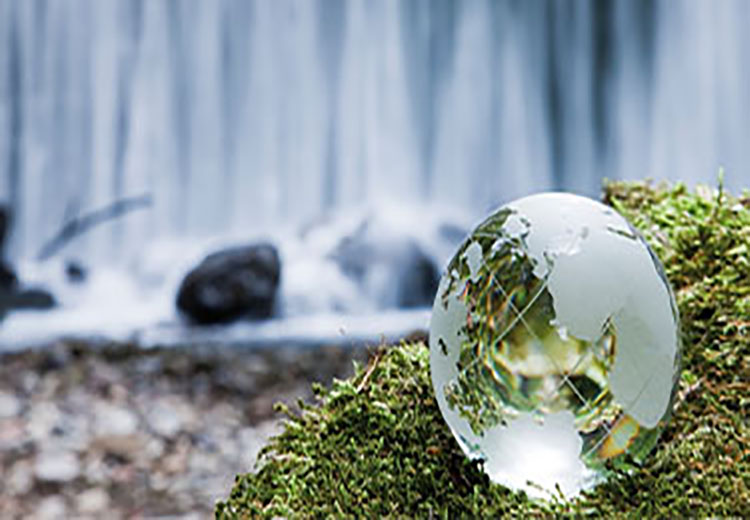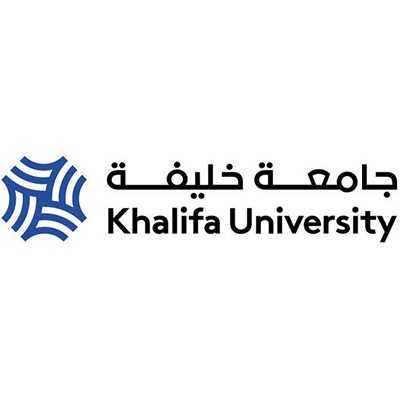Water and Environment

Sponsored by

WATER AND ENVIRONMENT
Khalifa University exists in one of the world’s most water-scarce nations – the United Arab Emirates – which receives around 100mm of rainfall per year, has no freshwater rivers, or lakes. Managing the country’s very limited freshwater resources presents many technological, environmental, and systems management challenges. That is why water and environment is a key research vertical at Khalifa University, with subthemes of desalination and wastewater treatment, carbon capture utilization and storage, and solid waste management and utilization. Two dedicated research centers – the Center for Membranes and Advanced Water Technology and the Sustainable Bioenergy Research Consortium – are pursuing innovative solutions to key local challenges.
DESALINATION AND INDUSTRIAL WATER TREATMENT
Desalination is the process of extracting fresh water from saline water. Despite being energy intensive and costly, desalination is still an attractive solution for many countries suffering from severe water scarcity. Over the last 20 years, global desalination capacity has increased by more than 15-fold. While massive technical developments have helped make desalination much more affordable than it was in the past, the long-term sustainability of desalination as a solution for water shortage and supply is often questioned. The research of Prof. Hassan Arafat, Director of the Khalifa University Center for Membrane and Advanced Water Technology and Professor of Chemical Engineering at KU, focuses on improving the viability and sustainability of desalination, such as developing techno-economic models to assess the feasibility of desalination processes, particularly ones powered by renewable energy. Dr. Arafat’s research looks at the environmental impacts of desalination and how to reduce them through a process called membrane distillation, which can process the highly saline brine leaving the desalination plants, thus reducing its effects on marine life. His research team is also involved in developing fouling-resistant membranes for several desalination and water treatment processes, to reduce the use of energy and cleaning chemicals and the disruption of process operation.
ENVIRONMENTAL RESOURCE MONITORING
The Coastal and Environmental Sensing and Modeling (CESAM) Lab at KU focuses on studying natural processes and addressing environmental challenges the UAE and region face in order to propose solutions and decision support for stakeholders. The lab’s overarching goal has been to advance science in the field of environmental sensing and modeling and adapt the existing models to the arid and hyper-arid context. CESAM has been awarded several research projects funded by government authorities and stakeholders in the UAE, the region, and the world.
The research activities in CESAM lab, led by Associate Professor of Civil Infrastructure and Environmental Engineering Dr. Marouane Temimi, addresses land, atmosphere, and ocean processes and the interactions between them. The research has been based on an extensive use of satellite remote sensing, numerical models in high performance computers, and ground-based sensors.
His team of researchers at CESAM have successfully deployed a comprehensive air quality monitoring system in the UAE, which is now hosted at the Ministry of Climate Change and Environment for public use. In addition, CESAM has been providing Etihad Airways with a fog tracking and forecast system that uses both satellite and advanced numerical models, which is evolving to an aviation weather decision support system.
CESAM has also been working with the National Center for Meteorology to develop a unified weather forecast model leveraging the outcomes of the UAE rain enhancement program. Moreover, the lab has worked on marine related issues, developing a number of relevant applications for oil spill and seawater quality tracking and monitoring in the region. CESAM has had success in collaboration with the UAE Space Agency and other partners in the development of UAE-wide land cover and habitat maps. The team has contributed to the validation of the SMAP NASA mission for soil moisture monitoring with an assessment of the product in the UAE and the region. Furthermore, CESAM lab has activities that are expanding rapidly in the UAE and broader region to cover new applications that address local needs for use of remote sensing and advanced numerical modeling.
RAINFALL ENHANCEMENT MATERIALS
Khalifa University Professor of Civil Infrastructure and Environmental Engineering Dr. Linda Zou is capitalizing on the unique capabilities of nanotechnology to support the country’s water security needs through her research leveraging nanotechnology to increase the production of water droplets in clouds, which in turn will help produce more rain.